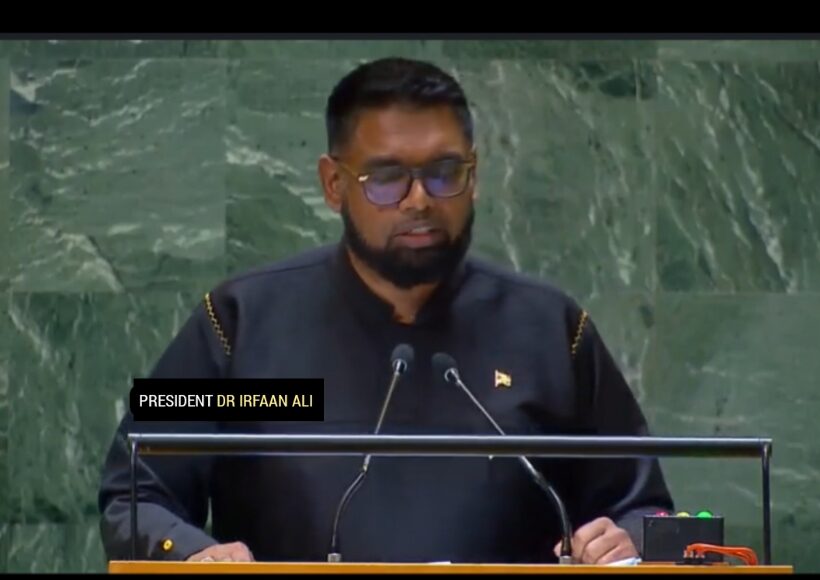In his address at the 76th session of the United Nations General Assembly today, President Irfaan Ali underscored the UN’s vital responsibility in ensuring the security of small states, particularly in light of Guyana’s ongoing controversy with Venezuela.
“Small states look to multilateralism and the rule of international law to protect them from foreign aggression,” he stated, emphasizing the need for robust international support.
The president articulated that Guyana has been enduring tensions with Venezuela which has persisted throughout the nation’s 58 years of independence. He said, “International law and its strict application have been our armour and our shield in our determination to protect ourselves from this aggression.”
In detailing the historical context of the territorial dispute, the President reminded the assembly that “the border between Guyana and Venezuela was fully, finally and perfectly settled in an 1899 award by an International Tribunal.” He stressed that Venezuela was fully represented in this tribunal, which it welcomed and accepted for over sixty years before reopening the issue. “Venezuela was fully represented in that tribunal whose award it proclaimed in its own Congress and welcomed for more than six decades before reopening the issue on the eve of Guyana’s independence, claiming two-thirds of our territory,” he noted.
Moreover, Ali emphasized that the controversy, initiated by Venezuela, was submitted by Guyana to the International Court of Justice (ICJ) in accordance with a decision of the United Nations Secretary General. He stated, “This is consistent with our position to settle this matter by legal and peaceful means.”
In light of escalating aggression, the ICJ had issued provisional measures calling for Venezuela to refrain from actions that could alter the status quo in the disputed territory. “Pending a final decision in the case, the Bolivarian Republic of Venezuela shall refrain from taking any action which would modify the situation that currently prevails in the territory in dispute, whereby the Co-operative Republic of Guyana administers and exercises control over the area,” the measures had noted.
Expressing cautious optimism, the President welcomed Venezuela’s recent decision to engage in the ICJ proceedings. “We welcome Venezuela’s decision to participate in the Court’s proceedings, and express the hope that Venezuela will accept the decision of the Court, as Guyana has long pledged to do.” He reaffirmed Guyana’s commitment to a peaceful resolution of the long-standing controversy, noting, “I reaffirm Guyana’s unwavering commitment to a peaceful resolution of this long-standing controversy in full conformity with international law and the principles set forth in the United Nations Charter.”
He also highlighted broader issues of global governance, advocating for a more inclusive and equitable form of multilateralism. “Peace, development and human rights are pillars of the United Nations,” he stated, urging member states to ensure that no one is left behind. In addition, he underscored the critical importance of women’s participation and leadership in both private and public sectors, recognizing their integral role in sustainable development.
The president also emphasized that these reforms must align with the developmental needs and aspirations of all countries. “These reforms must go beyond fair representation and ensure that the policies and practices of these institutions align with the developmental needs and aspirations of all countries,” he stated, highlighting the urgency of these changes.
He reminded the assembly that the UN must fulfill its role as a custodian of global peace, a promoter of sustainable development, and a protector of human rights and international law. “Let us act together, for the advancement of peace, for the achievement of sustainable development, and the preservation of human dignity, now and for generations to come,” he stated.













